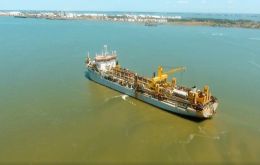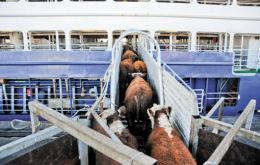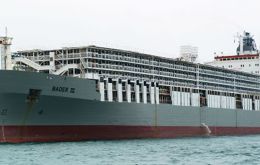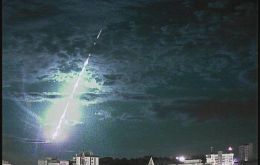MercoPress. South Atlantic News Agency
Tag: Rio Grande do Sul
-
Monday, June 13th 2022 - 20:39 UTC
Third case of monkeypox confirmed in Brazil

Brazilian health authorities Monday confirmed the third case of monkeypox nationwide had been detected. It was a 51-year-old Porto Alegre resident who had returned from Portugal last week.
-
Thursday, July 29th 2021 - 08:47 UTC
Cold wave brings snow to several Brazilian cities in the state of Rio Grande do Sul

At least 13 cities in the Brazilian State of Río Grande do Sul Wednesday recorded snowfalls, a rare event for the region, but one that has come to be due to this year's harsh winter temperatures.
-
Tuesday, July 27th 2021 - 07:31 UTC
Community case of Delta coronavirus variant detected in Brazilian state of Rio Grande do Sul

The Brazilian State of Rio Grande Do Sul, where President Jair Bolsonaro said last week they should get ready to welcome Argentine refugees, has instead Monday confirmed the community transmission of the coronavirus Delta variant in addition to three cases detected previously.
-
Tuesday, April 20th 2021 - 10:45 UTC
Brazil's Anvisa green-lights studies of new Chinese covid-19 vaccine

Brazil's National Health Surveillance Agency (Anvisa) has given the green light to clinical trials on volunteers of a potential anti-Covid-19 vaccine produced by the Chinese laboratory Sichuan Clover Biopharmaceuticals, it was announced.
-
Friday, March 5th 2021 - 08:57 UTC
Dramatic Covid-19 situation in Southern Brazil threatens Rivera, Uruguay

Uruguay is very concerned, and threatened, by the situation in the city of Rivera, bordering the Brazilian city of Santana do Livramento, Rio Grande do Sul state, where the number of infections is alarming and continues to grow, while the Intensive Care Centers in the capital Porto Alegre are saturated.
-
Thursday, October 29th 2020 - 08:39 UTC
Brazil has a super port in the southern state of Rio Grande do Sul

After two years of dredging works using a federal investment of R$ 500 million, (some 80 million dollars) the Port of Rio Grande – the main port in the southernmost Brazilian state of Rio Grande do Sul – will be able to receive vessels of up to 366 meters in length. This is because the port’s new draft, (15 meters) was officially approved on October 26th.
-
Tuesday, September 15th 2020 - 09:00 UTC
Southern Brazil leads in exports of live cattle: US$ 111 million in seven months

The port of Rio Grande in the Brazilian state of Rio Grande do Sul is shipping 4,000 head of cattle for Lebanon and 22,000 destined for Turkey, totaling 26,000 animals to be exported.
-
Monday, July 6th 2020 - 07:25 UTC
China suspends imports from two pork plants in the state of Rio Grande do Sul

China has suspended imports from two Brazilian pork plants owned by meatpackers JBS SA and BRF SA, according to the Chinese customs authority, as it cracks down on meat shipments amid concerns about the new coronavirus.
-
Wednesday, April 1st 2020 - 07:50 UTC
Largest ever shipment of cattle loaded at Rio Grande port in South Brazil

The Bahamas flagged vessel named Bader III, which specializes in transporting live cattle, docked last weekend at Estaleiro Rio Grande Pier, Brazil, to handle the largest ever shipment of such cargo at the port.
-
Monday, April 15th 2019 - 17:41 UTC
Spectacular fireball across the night sky was recorded in southern Brazil

A spectacular fireball was recorded blazing across the night sky over Rio Grande do Sul and the state of Santa Catarina in southern Brazil around 3:21 a.m. local time (6:21 UTC) on Friday.
